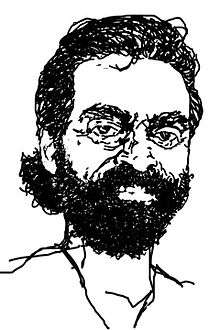P. M. Taj
| P. M. Taj | |
|---|---|
 | |
| Born |
Puthiyara Maliyakkal Taj 3 January 1956 Kozhikode, Kerala, India |
| Died | 29 July 1990 (aged 34) |
| Occupation | Playwright, script writer, actor, director |
| Language | Malayalam |
| Nationality | India |
| Genre | Fiction, humour, non-fiction |
| Children | Sonal Taj PM, Vishal Taj PM |
Puthiyara Maliyakkal Taj (Malayalam: പി. എം. താജ്) (3 January 1956 – 29 July 1990), popularly known as P. M. Taj, was an Indian creative writer, actor, screenwriter, and director in Malayalam theatre.[1] He was a prominent cultural figure in Kozhikode. Taj wrote many plays during his short span of life and won several awards including the Sakthi Award, instituted in memory of the progressive Malayalam writer Cherukad, and the Kerala Sangeetha Nataka Akademi Award twice.
Early life
P. M. Taj was born in a typical middle-class family in Kozhikode, Kerala as the eldest son of P. M. Alikoya, a businessman, and K. T. Asiya. He has three siblings; Iqbal, Jabeen, and Yasmin. He was also a nephew of the dramatist K. T. Muhammed.
Taj's education was mostly in Kozhikode. He attended the Sri Gujarathi Vidyala for his primary education and then studied at Zamorin's Guruvayurappan College for his higher education. During his school and college days, Taj won several awards in various cultural events. He also had an active participation in college politics. After graduation he worked as an editor for two years in Yuvadhara, a magazine published by DYFI. His debut drama was Perumbara, published in 1977. He married Bichu in 1986 and they have of two sons – Sonal Taj and Vishal Taj.
Selected works
His most famous plays include: Kudukka Athava Vishakkunnavante Vedantam, Kanallattom, Ravvunni, Pavathan Nadu, Perumbara, Mary Lawrence, Thalasthanathuninn Oru Vaarthayumilla, Kurukan Kunjaammante Vaal, Perumkallan, Priyapetta Avivahidhan, Chakram, Aalmarattam, Ambalakaalla, Uthram Thirunallinte Kalpana Pole, Ennum Ennum Priyapetta Amma, and Agraharam.
Myths and folklore had an influence on Taj, but he used them to send a different message in a modern context. Some of his characters like, Ravunni, become part of a sad and bitter tale about globalisation.
Films
- Uyarum Njan Nadake (1985)
- Atham Chitira Chothy (1986)
- Kurukkan Rajavayi (1987)
- P.C. 369 (1987)
- Njan Piranna Nattil (1985)
- Bali (1991)
Awards and recognitions
- Kerala Sangeetha Nataka Akademi Award in 1982 for Kudukka the gospel of hungry man
- Cherukaad Smaraka Shakthi Award in 1983
- Akilendhya Nadaka Award in 1983
- Kerala Sangeetha Nadaka Academy Award in 1989 for Paavathan Naad
- Calicut University took Perumbara as reference book in 1990
- Kerala University took Kudukka The gospel of hungry man as reference book in 2011
References
- ↑ "P.M. Taj, playwright of our times". The Hindu. 30 July 2008. Retrieved 21 April 2011.
- "Remembering PM Taj". The Hindu. 26 July 2016. Retrieved 26 July 2016.
- Borne artiste. Indian Express. 11 August 1990. Calicut.
- "A journey through history". The Hindu. 11 August 2003. Retrieved 21 April 2011.
- Mega Jyothisudhan kshanika jeevitham, K.F George, Malayala Manorama, 28 August 1990, Calicut.
- Dhuranthangal irannu vaagiya oru kalaakaran. Madhyamam. 11 August 1990. Caliciut.
- Neru Kanda ee Kannukall porullarinja ee hridhayam. K.S. Hariharan. Deshabhimani. 3 August 1990. Calicut.
- Staff Reporter (26 July 2006). "Theatre festival in memory of P.M. Taj". The hindu. Retrieved 21 April 2011.
- "Best of theatre on show at festival". The Hindu. 28 March 2011. Retrieved 21 April 2011. The Hindu. Monday, 28 March 2011
- "Taj theatre fete begins". The Hindu. 27 July 2010. Retrieved 21 April 2011. The Hindu. 27 July 2010. Retrieved 20 April 2011
- "taj akalathil annanjupoya thejwala". Deshabhimani. 30 July 1999.
- A.K Ramesh (5 August 1990). "Aa nakshthram veennu poyirikkunnu". Deshabhimani.
- A.R Mohanan (29 July 1991). "taj ninte vellicham mangiyittilla". Kerala Kaumudi.
- "ormakil niranja taj". Malayala Manorama. 29 July 2006.
- "tajinte rachanakal vimochanathinte ithu savageetham". Deshabhimani. 1 September 1990.
- K.S Hariharan (4 August 1991). "ravunniyudey chiri". Deshabhimani.
- K. T. Muhammed (25 July 2004). "p.m taj enna nadaka prathibha". mathrubhumi.
- "janakiyanataka prasthanathinte chithanyadharayil taj smaranna". Deshabhimani. 31 July 1993.
- "nagarathil ormakal niraye taj". Malayala Manorama. 28 July 2006.
- M. N. Vijayan (29 July 1991). "taj kavivargathinte oru adayallam". Deshabhimani.
- Muralitharan Parayanjeri (13 August 1997). "taj ninte kaalam theaterinte vasanthamayirinnu". Prathibham.
- Sudeer Ambalappad (26 July 1996). "taj -oru prathbhasam". Calicut Times.
- T.K (29 July 1991). "taj kandhadharshiyaya nadakakrth". Deshabhimani.
- sree (19 July 1993). "tajiney pole taj maathram". Times.